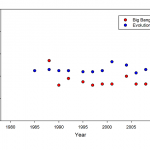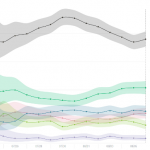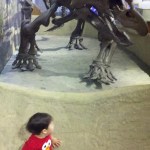society
When I wrote about Benjamin Bratton's anti-TED rant I only talked about the comment about the low success rate of TED suggestions. That was, admittedly, a small piece of his article, but the rest of it was so ludicrously overheated that I couldn't really take it seriously. It continues to get attention, though, both in the form of approving re-shares on my social media feeds, and in direct responses such as a rebuttal from Chris Anderson himself and most recently a long piece by Christiana Peppard at Medium, which are getting their own collection of approving re-shares. So I guess I ought to…
I am crushingly busy right now-- massive book rewrites needed, papers to grade, etc.-- so I've actually been fairly happy with the general lack of topics that inspire a deep desire to blog. which of course, was promptly upset this morning, when a brief outburst of hating on Carl Sagan erupted on Twitter just as I was about to head to the gym.
The catalyst was the hoopla surrounding the donation of Sagan's papers to the Library of Congress, which though it isn't specifically cited was the cause of a flurry of Twitter discussion that I think led to Erin Podolak's anti-Sagan manifesto, which in…
A couple of weeks back, DougT won this year's Nobel betting pool, and requested a post on the subject of funding of wacky ieas:
could you comment on this: http://www.space.com/22344-elon-musk-hyperloop-technology-revealed.html and the phenomenon of the uber-rich funding science in general. It seems to me that there used to be more private funding of science, and there still is a lot. But is government funding crowding out private funding (political question), is government funding necessary for Apollo and CERN b/c it’s so huge, is private funding more “out there” and therefore on the tails of…
The ongoing mess over Bora Zivkovic's harassment of women writers in connection with his editorial role at Scientific American and Science Online has moved into the "What is to be done now?" phase. The most prominent and linkable of these are from Maryn McKenna and Kelly Hills, though I've also seen the edges of more ephemeral discussions on Twitter. Much of this has focused on formal organizational changes, stripping Bora of power and titles and banning him from the conference. These are entirely appropriate, though partly moot given that he's resigned from both Scientific American and…
There was a great big New York Times article on women in science this week, which prompted no end of discussion. (I also highly recommend Bee's response at Backreaction.) It's built around the personal story of the author, Eileen Pollack, a physics major at Yale who decided not to go to grad school, and her story is compellingly told, providing a nice frame to her investigation of the question of why there continue to be so few women in the sciences.
Pollack comes out very much in favor of the notion that many women choose not to go to graduate school in the sciences because they don't…
SteelyKid's kindergarten teacher is big on incentives and prizes-- there are a number of reward bags that get sent home with kids who excel in some particular area. I'm not entirely sure what's in these, because SteelyKid hasn't gotten any yet.
This isn't because she misbehaves-- from all reports, she's very good-- but she's in a class with 21 other kids, and they've only been in school for a couple of weeks. Still, she regards this as a grave injustice, and I occasionally get aggrieved reports about the distribution of reward bags when I pick her up from after-school day care. I try to…
Last week, before we headed out for the weekend, I had a brief exchange with Ben Lillie on Twitter, prompted by the following set of tweets:
OK, here's a thing. I'll often hear people complain that Hollywood gets science wrong because there's *1* scientist who does everything 1/3
— Ben Lillie (@BenLillie) September 27, 2013
But in reality, science is massively collaborative. So why can't storytellers get that right? 2/3
— Ben Lillie (@BenLillie) September 27, 2013
*BUT* at the same time we have, and wildly celebrate, the Nobel, which embodies exactly that myth. 3/3
— Ben Lillie (@BenLillie…
In a comment to yesterday's post about the liberal arts, Eric Lund makes a good point:
The best argument I have ever heard for doing scholarship in literature and other such fields is that some people find it fun.
I single this out as a good point not because I want to sneer at the literary disciplines, but because with a little re-wording, this could apply to just about anything. The best reason for studying any academic subject is because it's fun.
This is, as I alluded to in a later comment of my own, a significant source of tension for Delbanco's book and a lot of other arguments about…
The JCC day care is closed today for one of the fall cluster of Jewish holidays, which means I'm spending the morning with The Pip before Kate comes home to take the afternoon shift so I can teach my class. Thus, this is more of a tab clearance sort of exercise than a thoughtful examination of the underlying issues. But having spent a bunch of time in the recent past on gender gaps of various sorts, these are some recent links that struck me as interesting enough to pass along.
-- Via Crooked Timber, Anca Gheaus offers cheers for being the "token" woman at academic conferences. This is mostly…
While I'm quoting other people saying smart things, Timothy Burke has another great post on the failures of economic models of higher education
There is a lot of information that you could acquire about courses or about colleges that you could reasonably use to assemble a decision matrix. What size is the class or the college? Do you have a good reason for thinking that you flourish in small or large classes or institutions? What do you think you need in terms of knowledge or training? What kinds of environments and teaching styles do you enjoy or find stimulating? And so on–this often…
In one of those Information Supercollider moments, two very different articles crossed in my social media feeds, and suddenly seemed to be related. The first was this New York Post piece by a college essay consultant:
Finally, after 15 or so years of parents managing every variable, there comes the time when a student is expected to do something all by herself: fill out the actual application. Write an essay in her own voice.
By this point, our coddled child has no faith in her own words at all. Her own ideas and feelings, like a language she has not practiced, have fallen away.
Her parents…
Adam Frank has an op-ed at the New York Times that tells a very familiar story: science is on the decline, and we're living in an "Age of Denial".
IN 1982, polls showed that 44 percent of Americans believed God had created human beings in their present form. Thirty years later, the fraction of the population who are creationists is 46 percent.
In 1989, when “climate change” had just entered the public lexicon, 63 percent of Americans understood it was a problem. Almost 25 years later, that proportion is actually a bit lower, at 58 percent.
The timeline of these polls defines my career in…
"[S]cience is not a consumption good to be expanded in good times and restricted in bad times. The doing of science as well as the supporting of science is an expression of faith in the future. It would have been possible to have told Newton and Faraday, Maxwell and Einstein, Bohr and Heisenberg that, given the poverty and squalor around them, their research were luxuries which could not be afforded. To have done so would be to destroy the economic c progress that came out of their science and which was the main factor in relieving that poverty and squalor. We seem to be on the verge of…
There was some buzz Thursday about a poll showing that 40% of white people don't have any friends of a different race. Ipsos/Reuters include a spiffy "data explorer" where you can make graphs like the one above. It does not appear to provide an easy way to get at the actual wording of the question, which is kind of crucial, and thus renders most of the stories about it too vague to take all that seriously.
Of course, this is somewhat reminiscent of the gender bias story from a couple of weeks ago, where it was shown that single-gender physics departments are not a clear indication of sexism.…
The kids and conferences issue, discussed here a while ago has continued to spark discussion, with a Tenure She Wrote piece on how to increase gender diversity among conference speakers and a Physics Focus blog post on a mother who wound up taking her toddler to a meeting. There are some good points in both, though the Tenure She Wrote poster seems to be in a field whose conferences run on a different model than that used for most meetings I go to.
The Physics Focus post was particularly interesting to me, though, because I spent last weekend as the portable conference day-care while Kate…
In my darker moods, I sometimes suspect that all academics, regardless of their specialty, are engaged in the same pursuit: searching out and exposing the systematic oppression of... whatever department or program the faculty member speaking at the moment happens to belong to. No matter what field of study they work in, faculty seem to cultivate and even cherish a sense of victimhood. Somebody else has a bigger office, or a newly renovated building, or more support from the administration for their pet projects. Faculty with big offices and renovated space complain about the location, and…
Kate had to leave at 7am this morning to go to a "retreat" for her office, so I took the kids to Dunkin' Donuts for breakfast. That got us all out the door at the same time, avoiding the freakout from The Pip if he saw Mommy leave without him. Kate will be late getting home tonight, as well, so I've got dinner with the kids as well, and SteelyKid has already declared that she wants to go to the Irish pub downtown for sweet potato fries and fish & chips.
I mention this not because I want to fill the blog with trivial details of my personal life-- that's what Twitter is for-- but because it…
I mentioned on Twitter that I was thinking of proposing a Science Online program item about the professionalization of blogging, throwing in a link to post from a couple months ago. That included a link to this SlideShare:
Talking to My Dog About Science: Why Public Communication of Science Matters and How Social Media Can Help from Chad Orzel
And that was re-tweeted by Chris Chabris, kicking off a gigantic conversation about the whole idea of scientists communicating directly with the public (most of which took place after I went to bed last night, so I only saw it in my Twitter…
As you may or may not know, I'm currently at work on a book called How to Think Like a Scientist. This raises the fairly obvious question in the post title, namely, why should people think like scientists? What's the point?
In a sense, this is (as Ethan Zuckerman pointed out at lunch the other day) the underlying question at the heart of the whole endeavor of science communication. I mean, I've written two books about modern physics for a general audience, and when I have time, I write this blog aimed at non-scientists. What's the point of doing all that, anyway? What is it I hope to achieve…
We're entering the heart of College Admissions Season-- the offers are out, and students are doing the high-stress decision thing-- which means it's time for the New York Times to begin their annual series of faintly awful reports on the state of academia. And right on cue, there's this weekend's article about poor students who excel in high school not applying to top colleges.
To their credit, this at least isn't another article about how very, very hard it is for kids from affluent Connecticut suburbs to decide between several different elite schools. And as someone who grew up in a less…




